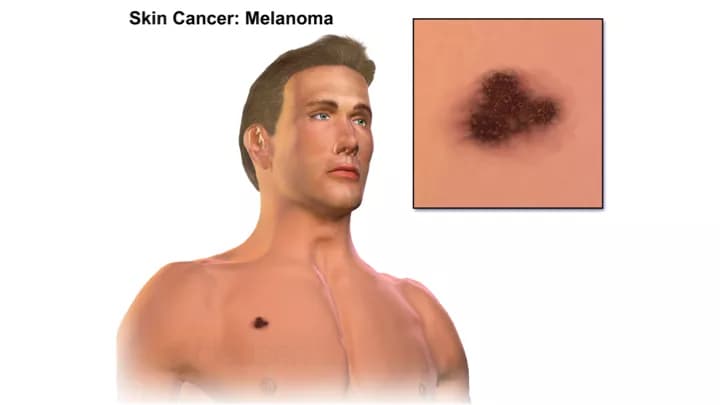
Researchers Look To Improve Detection Of Skin Cancer Lacking Pigment Melanin
New findings from an international research team led by University of North Carolina Lineberger Comprehensive Cancer Center scientists may improve detection of skin cancer that lacks any brown or black color.
The researchers published a study in the journal JAMA Dermatology that outlines key features linked to amelanotic melanoma, a form of skin cancer that lacks the brown or black color that stems from the pigment melanin. Researchers believe their findings could improve detection of this type of melanoma, which is more likely to be diagnosed at advanced stages.
"Amelanotic melanoma is linked to worse survival because it's more likely to be diagnosed at a later stage," said the study's senior author Nancy E. Thomas, MD, PhD, a UNC Lineberger member, the Irene & Robert Alan Briggaman Distinguished Professor and chair in the UNC School of Medicine Department of Dermatology. "We have identified phenotypic traits that will trigger doctors and patients to pay attention not just to pigmented lesions, but also to these pink spots."
The American Cancer Society estimates more than 87,000 cases of melanoma will be diagnosed in the United States this year. Melanoma accounts for only about one percent of skin cancers, but it causes a large majority of skin cancer deaths.
About 2 to 8 percent of melanomas are amelanotic, studies have shown. These skin cancers are seen predominately in white patients, and develop as pink growths. A 2014 study led by UNC Lineberger researchers found that amelanotic melanoma was typically diagnosed at more advanced stages than pigmented melanoma, and that the risk of death was higher. Amelanotic melanoma can evade detection because it falls outside a commonly used diagnostic criteria. The "ABCDE" guidelines flag lesions that are asymmetric, have irregular borders and color, a diameter of greater than 6 millimeters in size, and that have "evolved," or changed, as warning signs of cancer.
"Using these diagnostic criteria, a dermatologist might miss this type of melanoma because it not only lacks the color, but its irregular borders and asymmetry may also be harder to detect," Thomas said. "We wanted to identify patients at higher risk for amelanotic melanoma in whom we need to look carefully for this cancer type."
The researchers analyzed the characteristics of 178 patients with this disease drawn from a study of 2,995 melanoma patients enrolled in The Genes, Environment, and Melanoma study. The international study enrolled patients from 1998 to 2004.
They found that people who lacked moles on their backs, who had many freckles, and "sun-sensitive" features -- including red hair, light-colored eyes and an inability to tan -- had higher odds of developing amelanotic melanoma. In addition, people who previously had this disease were at higher risk, as were people who had variants of the MC1R gene that are linked to red hair.
"If patients have these traits, they need to be more carefully screened," Thomas said. "We hope this helps raise awareness for the potential for amelanotic melanoma in this group."
Materials provided by UNC Lineberger Comprehensive Cancer Center. Note: Content may be edited for style and length.
Disclaimer: DoveMed is not responsible for the accuracy of the adapted version of news releases posted to DoveMed by contributing universities and institutions.
Primary Resource:
Steven Vernali, Weston T. Waxweiler, Patrick M. Dillon, Peter A. Kanetsky, Irene Orlow, Li Luo, Klaus J. Busam, Anne Kricker, Bruce K. Armstrong, Hoda Anton-Culver, Stephen B. Gruber, Richard P. Gallagher, Roberto Zanetti, Stefano Rosso, Lidia Sacchetto, Terence Dwyer, Anne E. Cust, David W. Ollila, Colin B. Begg, Marianne Berwick, Nancy E. Thomas. (2017). Association of Incident Amelanotic Melanoma With Phenotypic Characteristics, MC1R Status, and Prior Amelanotic Melanoma. JAMA dermatology. DOI: 10.1001/jamadermatol.2017.2444
Related Articles
Test Your Knowledge
Asked by users
Related Centers
Related Specialties
Related Physicians
Related Procedures
Related Resources
Join DoveHubs
and connect with fellow professionals

0 Comments
Please log in to post a comment.